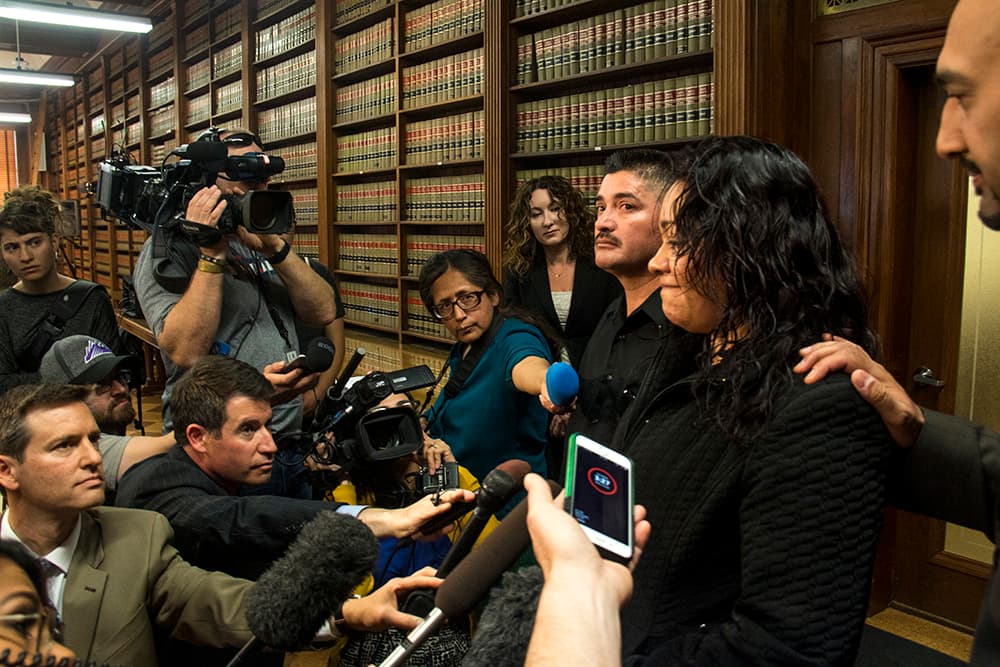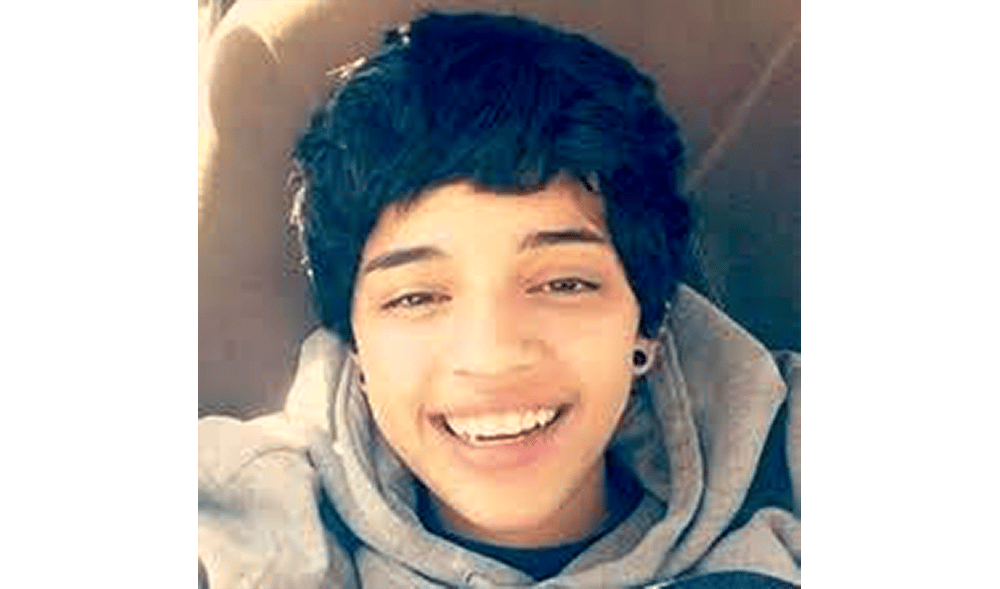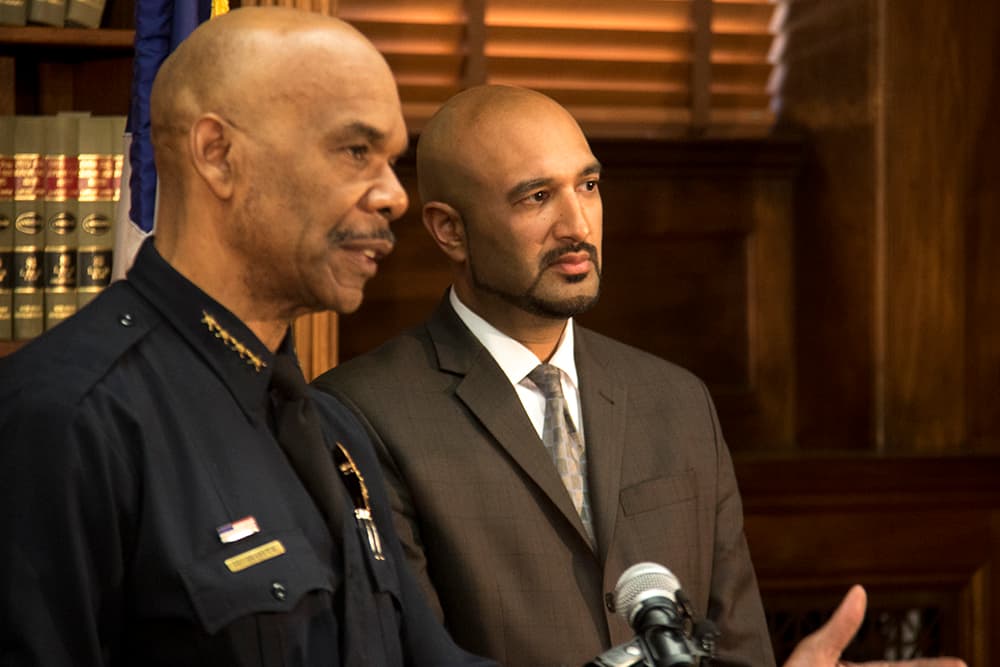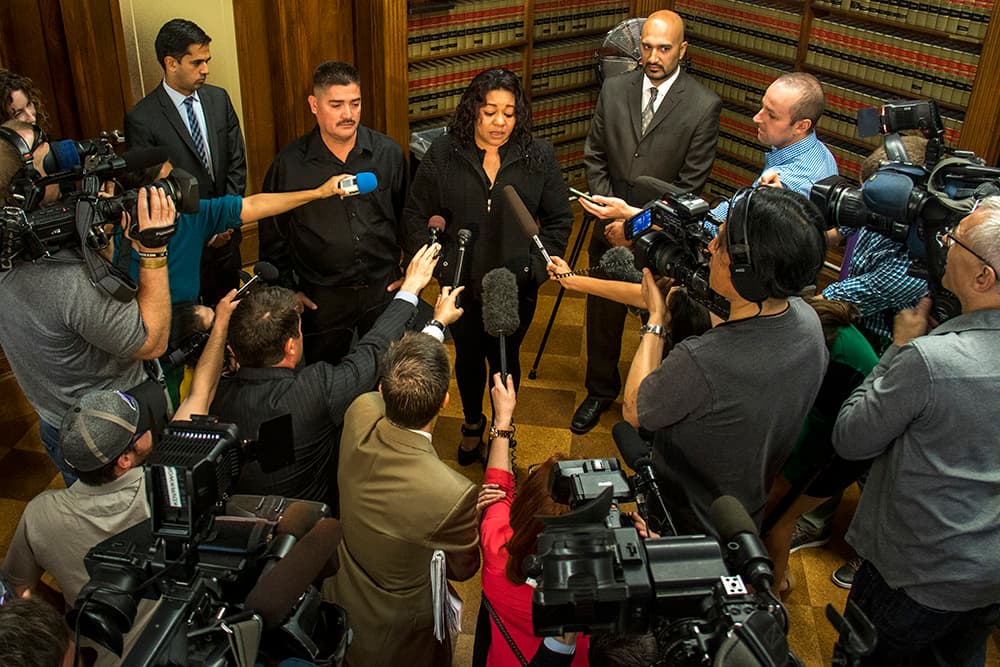
Jose Hernandez and Laura Rosales stood before more than dozen reporters and cameras in Denver's city hall this morning, a thicket of microphones thrust toward them. His eyes welled red and her mascara smeared at the edges of her eyes. They spoke quietly of their loss.
"It is a pain so strong that no one can even imagine," she said in Spanish. "You can't even cry when you lose your baby."
Today, they'd won a measure of closure: The city announced that it would pay out a substantial figure to the family, and would acknowledge that it had changed its policies in the wake of the death of Jessica Hernandez, the couple's daughter.
For the police department, and for its critics, it was a day to reflect on years of activism and reform. But the family's words were only about their daughter, who was shot and killed by Denver police officers two years ago at age 17.
"There is no amount of money in the world that can buy a life, and that's why we say, 'We want peace,'" her father said, also in Spanish.

Under the terms of the agreement:
- The city will pay $999,999 to the family, who in turn will release the officers and the city from any liability for their daughter's death.
- The department has pledged to host a community meeting focused on Latino and LGBTQ people; Jessica Hernandez identified as both.
- The family will be invited to appoint one person to the committee that is reviewing the police department's proposed new use-of-force policy.
- The city will help the family in setting up a nonprofit in Hernandez's legacy, should the family so choose.
"They’re still trying to determine what they want to do for Jessica’s legacy, and they don’t know yet," said Qusair Mohamedbhai, an attorney for the family. "They’re in Stage 1 grief, still."
City Attorney Kristin Bronson described the compromise as a way to avoid a legal battle that could bring years of division and pain. Tension at the time of Hernandez's death were so high that someone splashed red paint on a police memorial -- an action that her family tried to calm, Mohamedbhai said.
"We had parties on both sides who were prioritizing creative solutions," she said.
Mohamedbhai praised Bronson as an "agent of change," saying separately that Denver's police and civil leadership "tried to do right by the family."
The department has cleared the officers involved of wrongdoing, but the city has since changed the policy that allowed officers to fire into the moving car that Hernandez occupied; the officers said they feared she was going to strike them with the vehicle. (A summary of the incident is at the bottom of this post.)
"The fact that officers Greene and Jordan complied with the departmental policies that existed at the time of the incident does not negate the pain felt by all involved," DPD Chief Robert White said in a written release.
He acknowledged that the shooting was the "catalyst" for a review and eventual change of the policy -- a statement that advocates have long sought.

The journey to reach this point has been a long one.
In some ways, it has reshaped how the city and the community deal with police shootings.
"I think the progress is cumulative," said Lisa Calderón, co-chair of the Colorado Latino Forum in Denver. "It takes everybody’s effort in pushing and pushing. Change is also incremental -- we know we’re not going to see massive changes all at once, like some major cities, where there is a very high-profile shooting -- but instead what we get are baby steps."
More recently, Mayor Michael Hancock and the police chief spoke with the family as friends and community neighbors watched in silence at what Mohamedbhai described as a "profound" meeting.
"With this settlement, and through our work with the family and the Denver Police Department, we hope to effect positive change resulting from this unfortunate situation," Hancock said in a written release today.
Over these two years, organizers say they've convinced White and other city officials to meet with grieving mothers, which has produced some apparent changes in the city's reactions to shootings by police.
For one, the city government will establish a policy against "proactively" releasing criminal history information about people shot by police. Calderón says that the city intentionally released information that portrayed Hernandez as a troubled young woman with a criminal record after her death. The city denies that they intentionally did so.
"Before the investigation had even commenced into the activities of the police, there were statements by DPD representatives that basically trashed her reputation," Calderón said.
"And so we took Chief White to task. This was somebody’s daughter, and regardless of the circumstances, she did not deserve to die, and she didn’t deserve to have her character also devalued."

The family's attorney, Mohamedbhai, said that information on her background was "leaked" to the press. While criminal records are generally public record, that is not the case for juveniles, like Hernandez. Calderón also hopes that the police will better communicate with families before it releases the results of its investigations into the shooting officers' conduct and that the city will begin providing money for funerals and food after deaths.
"It doesn’t mean it’s an admission of wrongdoing to say that we recognize that your children’s death was the result of the actions of an agency of the city," she said.
She also wants the city to do more to include activists in reforms. For example, a new policy on use-of-force was drafted without community input. The department now is convening a committee to review that draft, and will allow the Hernandez family to choose one committee member.
"I’m glad that that’s going to happen for the Hernandez family," Calderón said. "But what about the Ronquillo family and the Avila family and the Castaway family?" she said.
"There’s this really counterintuitive dynamic, that the people who are working to hold the city accountable are not being included in the process -- once the city decides to do the right thing."
She wants the department also to better acknowledge and address the disproportionate rate of police shootings of Latino people.
Jan. 26, 2015:
Hernandez was behind the wheel of a stolen car early on the morning of Jan. 26, 2015, with four other teenagers. She was unarmed. A neighbor had called police to report a suspicious vehicle in the alley. Officers approached and told the teenagers to get out of the car.
The witnesses in the car said they had been smoking marijuana and drinking, and the windows were fogged up. One of the teenagers later told investigators they had urged Hernandez to escape through a gap between a patrol car and a fence, according to the district attorney’s investigation.
But officers told investigators they believed Hernandez was accelerating toward Officer Gabriel Jordan and that his life was in danger. Jordan and Officer Daniel Greene both fired at the car. Eight bullets struck the car, and three of them hit Hernandez.
Jordan was not actually hit by the car. He pushed off the driver’s side of the car with one hand and fired into it with the other.
The Denver Police Department later changed its policy to prohibit firing into moving vehicles if the only threat comes from the vehicle itself. That’s in line with best practices for use-of-force policies nationally.
At the time of her death, Hernandez was preparing to enlist in the Coast Guard. She was a kind-hearted young woman, often bringing food from her own family's table to feed people without homes, her family said. A thousand people attended her funeral.












